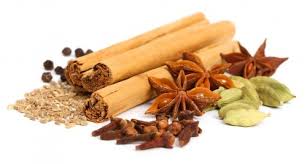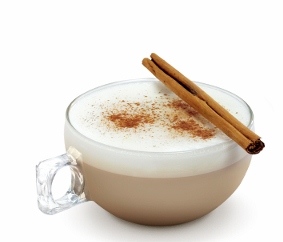 Photo: Courtesy of zesterdaily.com
Photo: Courtesy of zesterdaily.com
Monday is here again. I can feel the collective sigh of many as they start their workweek. Sometimes it takes that extra push to get going. Maybe your morning workout didn’t quite do it today. Perhaps the coffee is a little stale, and you’re dying for something new, something warm and soothing before you make a mad dash to work. Today, ditch the coffee and try another good alternative with less caffeine and more health benefits—Chai tea.
Masala Chai dates from the days of ancient courts in Siam and India and was used in the healing tradition of Ayurveda medicine. With sattvic (calming) properties and a natural healer, Chai has been used with yoga and massage for years to soothe the body. Gaining in popularity over the years, it is now a regular on many coffee house menus with options from traditional Chai to Chai Lattes. Traditionally, Chai is prepared with black, green, or oolong tea leaves and a blend of Indian spices such as cardamom, cinnamon, cloves, fennel, ginger, nutmeg, and black peppercorn. These herbs and spices contain antioxidants and healing properties to stave off a host of body ailments and free radicals.
 Photo: Courtesy of welladjusted.co
Photo: Courtesy of welladjusted.co
Healing Properties
- Black Tea: Boast antioxidants to fight free radicals in the body. May protect LDL (good) cholesterol, thus reducing cardiovascular disease. Also contains antibacterial and anti-cancer properties
- Cinnamon: Aids digestion, fights nausea and digestive issues. It increases circulation, reduces fatigue, and improves clarity and vitality. It contains anti-inflammatory, antibacterial, and antioxidant properties. It’s also beneficial as an aphrodisiac.
- Ginger: Contains anti-inflammatory properties, soothes the stomach, is valued as a circulatory stimulant and helps boost the immune system. Ginger also used to fight motion sickness and impotence.
- Cardamom: Detoxes and improves circulation, prevents respiratory allergies and improves mental disposition.
- Black Pepper: Provides antibacterial and antioxidants to improve digestion, supports circulation and boost metabolism.
- Cloves: Contain antiseptic and analgesic properties (pain relief), work synergistically to increase the potency of other herbs, and may also relieve ulcer pain.
- Fennel: Contains antioxidants and Vitamin C, potassium, and fiber, has anti-cancer effects, stimulates digestion, and eases laryngitis.
- Nutmeg: Promotes digestion and is used to treat kidney, lymph, and sciatica problems.
3:1 Ratio of Caffeine In Coffee
To consume the same amount of caffeine in one cup of coffee, you would have to drink three cups of Chai. It’s a great coffee substitute if you’re trying to reduce caffeine consumption, plus added health benefits.
Traditional Chai Tea Recipe
 Photo: Courtesy of www.fiveelementscafe.com
Photo: Courtesy of www.fiveelementscafe.com
Ingredients
4 black peppercorns
1 stick of cinnamon
6 green cardamom pods
6 cloves
1-inch ginger root, sliced and peeled
1 tablespoon loose black tea or 2 black tea bags
3 cups water
1 cup whole milk (for vegans try plant-based milk – soy, almond)
2 tablespoons sugar, preferably dark brown (or sweetener of your choice)
Directions
- Add spices together in a saucepan with the water and bring to a boil.
- Cover, and let simmer 5 minutes.
- Remove the saucepan from the heat and let steep 10 minutes.
- Return to a boil.
- Remove from heat and add the tea, let steep 3 to 5 minutes.
- Strain mixture and return to saucepan.
- Add milk and sugar and stir for one minute over low heat.
- Serve immediately.
*Serves four.
**If you don’t have time to prepare from scratch, you can buy Chai prepared as tea bags in many stores and just add your milk of choice.
Enjoy!
![]()



An acquired taste, but definitely a cleansing/balancing/healing brew. Great post, Denise.
LikeLiked by 2 people
Thank you! Inspired by my need for something other than coffee today. 🙂
LikeLiked by 1 person
I’m partial to Kombucha tea. Love the Multi-green with chlorella & spirulina. Also the ones with chia seeds in them.
LikeLiked by 1 person
Sounds good. I’ll have to give it a try. I’ve added spirulina as one of the sources for B12 in my vegan diet. Kombucha might be a great option. Thanks!
LikeLiked by 1 person
My pleasure. Kombucha is also a great pH balancing beverage.
LikeLike
I can tell from the ingredients. Must be very green in color, I assume.
LikeLiked by 1 person
Well the tea itself is not, necessarily. It depends on what tea is used to ferment it and the scobie, or starter used. Commercial brands are flavored with all kinds of fruits, etc.
LikeLiked by 1 person
Ah! Thanks for the information. It’s on my list of to do’s for today. 🙂
LikeLike
I really enjoyed reading this! Thank you. It was so informative and the recipe was such a nice touch! Xoxoxo.
LikeLiked by 2 people
Thank you! As I was telling another blogger, I was inspired by the need for something other than coffee Monday morning. Have a wonderful Tuesday!
LikeLiked by 1 person